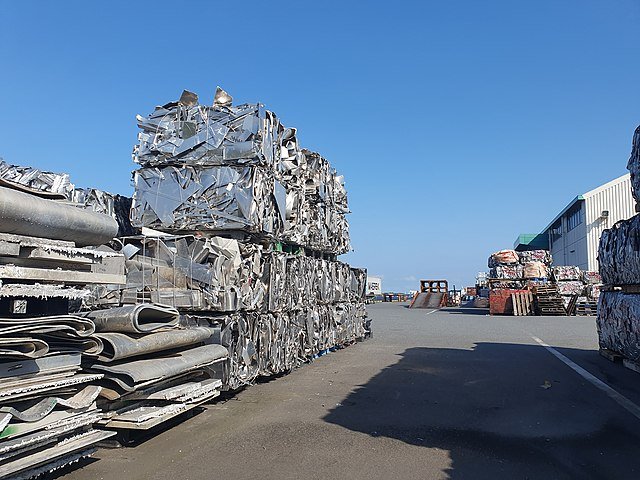Uses of Aluminum in Homes
Aluminum is a lightweight and durable material with many properties that make it ideal for a wide range of household applications. Due to its resistance to corrosion, lightweight, and flexibility in manufacturing, aluminum has become the preferred choice for many home projects.
Here are some of the most common Uses of Aluminum in homes.
Windows and Doors
Aluminum window and door frames are among the most common uses of this material in homes. Aluminum’s excellent resistance to corrosion makes it ideal for areas exposed to moisture or changing weather conditions. Additionally, aluminum is lightweight, making it easy to install windows and doors without affecting the home’s structure. Aluminum frames also offer a modern, sleek appearance and provide high efficiency in sound and heat insulation.
Interior and Exterior Surfaces
Uses of Aluminum for various surfaces inside and outside the home, such as insulating surfaces for walls and kitchens. It is also used to cover the exterior walls of homes or create modern facades that require weather-resistant materials. Due to its heat-reflective properties, aluminum helps improve energy efficiency by reducing the heat coming from the outside.
Kitchen Surfaces
Aluminum is a popular choice for modern kitchen designs. It is used to make kitchen surfaces such as shelves, kitchen tools like pots and pans, and even appliances such as refrigerators and microwaves. Aluminum can withstand high heat and remains lightweight and easy to clean, while its resistance to rust makes it ideal for utensils that are constantly exposed to water and moisture.
Reflective and Traditional Surfaces
Aluminum is also used in lighting and light distribution in homes. For example, it is used to manufacture ceiling lamps and recessed lights, helping distribute light evenly. Aluminum is also used in creating shiny surfaces that reflect light, adding a sense of space and brightness to small rooms.
Ventilation and Air Conditioning Systems
Uses of Aluminum in the production of mechanical systems for ventilation and air conditioning, such as ducts and pipes. Due to its lightweight and corrosion-resistant properties, aluminum is an excellent choice for ventilation systems that need to handle heavy usage throughout the day. Aluminum parts are also used in manufacturing fans and air conditioners to improve efficiency.
Furniture and Decoration
In many interior designs, aluminum is used to create pieces of furniture such as tables, chairs, bookshelves, and frames. Aluminum gives furniture a modern and stylish look while being both lightweight and strong. It can be easily shaped into innovative designs, allowing for decorative pieces that suit all tastes.
Solar Energy Systems
Aluminum is an ideal material for manufacturing solar panels due to its lightness and strength. It is used in the frame of solar panels, protecting solar cells from various environmental conditions. Additionally, aluminum is sustainable because it is easily recyclable, making it an excellent choice for renewable energy projects.
Fences and Terraces
Aluminum is also used to create fences and terraces due to its resistance to corrosion and ease of shaping. It can withstand natural elements such as wind and rain, making it perfect for low-maintenance fences that last a long time.
Aluminum Windows and Doors Manufacturing
Aluminum windows and doors are one of the most common applications of this metal in the construction industry. Thanks to the unique properties of aluminum, such as its lightweight nature, resistance to corrosion, and durability, aluminum has become the optimal choice for windows and doors, both in residential and commercial buildings.
Let’s discuss the importance of this industry, its advantages, and the reasons for using aluminum in windows and doors.
Advantages of Aluminum Windows and Doors
- Durability and Strength: Aluminum is a lightweight yet strong material, making windows and doors made from it durable and capable of withstanding harsh weather conditions. Aluminum frames are highly resistant to corrosion, making them ideal for areas with high humidity or constant climate changes.
- Corrosion and Rust Resistance: One of aluminum’s greatest features is its resistance to corrosion and rust. Unlike metals such as iron or steel, aluminum is unaffected by moisture or rain, making it an ideal choice for windows and doors in coastal or humid climates.
- Thermal and Acoustic Insulation: Aluminum windows and doors can be equipped with thermal and acoustic insulation properties by adding insulating layers inside the frames or using techniques such as “thermal profiles.” This helps reduce heat transfer from the outside to the inside (or vice versa), enhancing energy efficiency in homes and offices. It also helps reduce external noise, providing a comfortable and quiet environment indoors.
- Easy Maintenance: Aluminum windows and doors are extremely easy to maintain. They do not require repainting or special treatments like wood or iron. Regular cleaning is enough to maintain their fresh appearance.
- Modern Design: Aluminum offers flexible design possibilities, as it can be shaped in various ways to suit different architectural styles. Aluminum windows and doors can be made with thin profiles while maintaining high strength, allowing for larger glass windows and giving the building a modern, sleek look.
- Sustainability: Aluminum is 100% recyclable, making its use in windows and doors an environmentally friendly choice. Recycling aluminum reduces energy consumption and natural resource depletion, contributing to environmental preservation.
Types of Aluminum Windows and Doors
- Double-Frame Windows and Doors: These windows and doors feature an aluminum frame with a thermal insulating layer between the metal parts, improving both thermal and acoustic insulation efficiency. These types are the most commonly used in modern homes and commercial buildings.
- Folding Windows: Aluminum folding windows are an excellent choice for spaces that require good ventilation and open spaces. They can be fully opened, allowing natural air to flow into the room.
- Sliding Doors: Aluminum sliding doors are popular in many homes and offices, especially in places that require space-saving solutions. These doors do not require much space to open, making them ideal for small hallways and patios.
- Large Glass Windows: Large glass windows made of aluminum are widely used in modern architectural designs. Aluminum is strong enough to support large windows, allowing for expansive glass surfaces that provide beautiful views and natural light indoors.
Modern Technologies in Aluminum Windows and Doors Manufacturing
Uses of Aluminum in windows and doors industry has seen significant developments in recent years, with modern technologies contributing to enhanced performance and functionality. For example:
- Advanced Thermal Insulation Technology: This technology reduces heat loss and improves energy efficiency in windows and doors by inserting insulating materials within the metal frames.
- Corrosion-Resistant Coatings: In modern aluminum, corrosion- and rust-resistant coatings are used to extend the material’s lifespan and protect it from environmental factors.
- Insulated Aluminum: By using insulating materials between layers of aluminum, both thermal and acoustic insulation are improved, helping reduce energy bills and achieve a higher level of comfort in homes.
Uses of Aluminum windows and doors are an excellent choice for modern homes and offices due to their many advantages, including durability, corrosion resistance, thermal and acoustic insulation, and ease of maintenance. Additionally, they contribute to energy efficiency and environmental sustainability, as aluminum is recyclable. Thanks to these benefits, aluminum has become a core material in the manufacture of windows and doors, adding a modern and practical touch to architectural designs.

